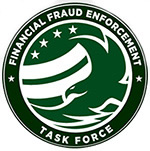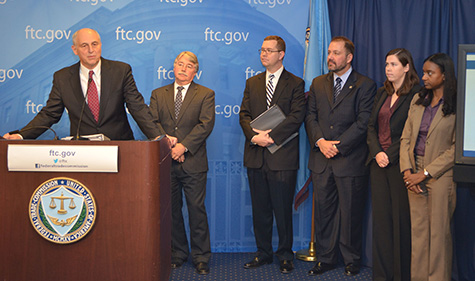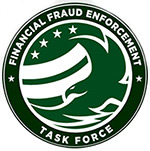The Federal Trade Commission today announced seven new law enforcement actions and  developments in five other FTC cases involving scams that falsely promise jobs and opportunities to “be your own boss” to people who are unemployed or underemployed. Six of the new FTC actions are the first cases brought under the FTC’s recently updated Business Opportunity Rule, which requires business opportunity sellers to provide specific information to help consumers evaluate a business opportunity, and provides a simple, one-page disclosure form.
developments in five other FTC cases involving scams that falsely promise jobs and opportunities to “be your own boss” to people who are unemployed or underemployed. Six of the new FTC actions are the first cases brought under the FTC’s recently updated Business Opportunity Rule, which requires business opportunity sellers to provide specific information to help consumers evaluate a business opportunity, and provides a simple, one-page disclosure form.
As part of a continuing federal-state crackdown, “Operation Lost Opportunity” targets scams that took millions of dollars from more than two million consumers. The defendants in the FTC’s cases allegedly lured consumers with deceptive offers to help them start businesses as mystery shoppers, credit card processors, website operators, and government insurance refund processors.
This joint effort by the Consumer Protection Working Group of the Financial Fraud Enforcement Task Force also includes 22 actions brought by the Department of Justice, 15 administrative actions by the U.S. Postal Inspection Service, and 20 actions by state attorneys general in Indiana, California, Arizona, Colorado, and Ohio. Earlier federal-state enforcement efforts against consumer financial fraud include Operation Empty Promises, Operation Bottom Dollar, and Operation Short Change.
“The scam artists the FTC shut down lied to people trying to make an honest buck, and robbed them of their money as well as their hopes,” said David C. Vladeck, Director of the FTC’s Bureau of Consumer Protection. “We brought these cases on behalf of millions of people who wanted to jumpstart their incomes and rebalance their budgets – people who placed their hopes in a business opportunity so they could better provide for their families.”
The defendants in the FTC cases announced today allegedly committed multiple violations of the FTC Act, including misrepresenting how much money people could make through the business opportunity. The defendants in six of the cases* also allegedly violated the amended Business Opportunity Rule.**

David Vladeck, Director, FTC Bureau of Consumer Protection, announces more than 70 civil and criminal law enforcement actions against promoters of fraudulent business opportunities at a Federal Trade Commission press conference in Washington on Nov. 15, 2012. Pictured, left to right: David Vladeck; Greg Zoeller, Indiana Attorney General; Stuart Delery, Principal Deputy Assistant Attorney General, Department of Justice; Shawn Tiller, Deputy Chief Inspector of the U.S. Postal Inspection Service; Janice Kopec, FTC Staff Attorney; and Tracey Thomas, FTC Staff Attorney.
FTC Law Enforcement Actions
*Shopper Systems, LLC; Revenue Works, LLC, also doing business as Surplus Supplier; EMZ Ventures, LLC; The Veracity Group, LP; Brett Brosseau; Michael Moysich; and Keith R. Powell allegedly sold the business of providing mystery shopping services to retailers, offering lists of merchants seeking mystery shoppers in the buyer’s area. According to the FTC’s complaint, consumers who agreed to buy were lured into buying another business opportunity – operating a webstore – that did nothing but draw them into negative-option programs (the seller interprets consumers’ silence or inaction as permission to charge them) with unforeseen, recurring monthly charges to their credit cards. Using text messages, phone calls, websites, ads in periodicals, and ads on online employment websites, the defendants allegedly falsely claimed people could earn an average of $50 per mystery shopping assignment with no limit to the number of assignments. They offered training for $2.95 and a seven-day trial period for the mystery shopping program, and subsequently charged $49.95 per month for a list of interested merchants, with an option to cancel at any time without further obligation. The defendants charged $3.95 for the webstore opportunity, with a 14-day trial period and $49.95 per month, and often enrolled consumers without their awareness. Consumers who canceled the mystery shopper membership were still billed monthly $49.95 charges and were later told they had to cancel both programs, which is how many consumers first learned they had been enrolled in the second program.
The Commission vote authorizing the staff to file the complaint was 3-0-2, with Commissioner Rosch abstaining and Commissioner Ohlhausen not participating. The complaint was filed in the U.S. District Court for the Southern District of Florida. On October 31, 2012, the court issued a temporary restraining order that halted the defendants’ deceptive practices, froze assets, and put the companies into receivership temporarily. At a recent hearing, the Court indicated that it would continue these provisions as to defendants Shopper Systems, LLC, Surplus Supplier, and Michael Moysich. Defendants EMZ Ventures, LLC and Brett Brosseau agreed to a preliminary injunction that also continues the terms of the order.
*American Business Builders LLC; ENF LLC, also doing business as Network Market Solutions; UMS Group LLC; United Merchant Services LLC; Universal Marketing and Training LLC; Unlimited Training Services LLC; Shane Michael Hanna, also known as Shane Michael Romeo; and Stephen Spratt took tens of thousands of dollars from consumers, falsely promising that they would set up a profitable credit card processing business for the consumers. According to the FTC’s complaint, the defendants told consumers that, for a fee typically ranging from $295 to $495, they could operate a home-based business selling the defendants’ payment processing services, credit card terminals, and merchant cash advances to merchants in the consumers’ local communities. The defendants claimed consumers would earn substantial income from this business opportunity in several ways, including by earning a commission on each payment processing terminal sold or leased, a percentage of each merchant cash advance, and a percentage of each merchant’s monthly sales volume. The defendants also sold consumers merchant leads for the consumers’ businesses, promising they would conduct telemarketing sales campaigns on the consumers’ behalf that would generate customers and income for the business. The defendants typically charged $10 per lead, with some consumers paying up to $40,000. The FTC alleged that the defendants did not obtain customers for consumers, and that consumers did not earn any income.
The Commission vote authorizing the staff to file the complaint was 5-0. The complaint was filed in the U.S. District Court for the District of Arizona. On November 6, 2012, the court halted the defendants’ allegedly deceptive practices, froze their assets, and put the companies into receivership pending a court hearing.
*The Online Entrepreneur Inc., also doing business as The Six Figure Program and Ben and Dave’s Program; Ben and Dave’s Consulting Associates Inc.; Benjamin Moskel; and David Clabeaux sold consumers a no-risk, money-back guaranteed opportunity to make money via their own website. According to the FTC’s complaint, they claimed that, for a $27 fee, they would enable consumers to affiliate with the websites of “big companies,” including Prada, Sony, Louis Vuitton, Verizon, and earn commissions when Internet users clicked through the consumers’ websites and bought something from the “big” retailers. After buying the programs, consumers found they could use their website only if they purchased a domain name and hosting services, but some consumers who paid the extra money could not get their website to function, and those whose websites did work did not earn the promised income of up to $15,000 per month or at least up to $15 within seven days. Consumers allegedly found it hard to reach the defendants for assistance, and those who sought refunds typically got an automated response saying someone would call them within 24 hours. The FTC alleged that refund requests were often ignored, even after consumers contacted the Better Business Bureau.
The Commission vote authorizing the staff to file the complaint was 5-0. The complaint was filed in the U.S. District Court for the Middle District of Florida. On November 6, 2012, the court halted the defendants’ allegedly deceptive practices, froze their assets, and put the companies into receivership pending a court hearing.
Career Advancement Group. According to the FTC’s complaint, the defendants have operated a nationwide job scam by placing ads in classified sections of newspapers and on job search websites that appear to be postings for jobs with the U.S. Postal Service. In fact, however, the defendants’ ads are not a legitimate job opportunity, and consumers who call the defendants to apply for a Postal Service job are tricked into spending over $100 for what turns out to be a booklet of general job-seeking advice, the FTC alleges. The defendants are Career Exams Inc., also doing business as Career Advancement Group; O’Brien Marketing Inc., also doing business as O’Brien Consulting and O’Brien Answers; Jeryn B. Lee; and Derek Jackson.
The Commission vote authorizing the staff to file the complaint was 4-1, with Commissioner Rosch voting no. The complaint was filed in the U.S. District Court for the Western District of Kentucky. On November 2, 2012, the court temporarily halted the defendants’ deceptive practices and froze their assets pending resolution of the case.
*Smart Tools LLC and Kirstin Hegg sold a home-based business opportunity that promised purchasers they could become “Government Insurance Refund Processors.” According to the FTC’s complaint, Smart Tools and Hegg mailed thousands of postcards falsely claiming consumers could earn up to $38,943 per year – just by finding those eligible for refunds of their mortgage loan insurance premiums and charging them a fee to tell them how to get those refunds. Consumers were persuaded to pay $3.91 for a manual describing how to find people who are owed refunds, in addition to paying a recurring monthly charge of $29.99 (after a free trial period) for access to lists of refund-eligible persons and some refund-processing software. Although Smart Tools and Hegg led consumers to believe that the lists of those eligible for refunds were not available free of charge, they allegedly buried on page 8 of their 31-page manual an inadequate, inconspicuous disclosure that the Department of Housing and Urban Development offers the same lists for free online.
The Commission vote authorizing staff to refer the complaint to the Department of Justice was 5-0. The DOJ filed the complaint on behalf of the Commission in the U.S. District Court for the District of Oregon, Portland Division.
*Rebate Data Processor. Christopher Andrew Sterling, doing business as rebatedataprocessor.com, sterlingvisa.com, and creditcardworker.com, and via links to those websites from other websites, allegedly claimed consumers could earn from $200 to more than $1,000 per day by processing applications for rebates or credit cards offered by certain marketers. In fact, all Sterling allegedly provided, if anything, was information on how to become an affiliate marketer by creating your own Internet ads for credit card offers. The ads would generate income only if someone saw an ad and made a purchase. According to the FTC’s complaint, Sterling promised that, for a minimum fee of nearly $50, he would provide customers for the data processing services. One of his websites stated, “Rebate Processing Jobs – You Can Process Simple Customer Rebates from Home and Earn $15 each GUARANTEED!” His claims included a statement that people could earn “$15,526 in 29 days.” In fact, few, if any, consumers were likely to make the kind of income Sterling claimed, the complaint alleges, because he misrepresented the nature of the business opportunity, because affiliate marketing is complicated and highly competitive, and because Sterling sometimes failed to provide any information in return for a purchase.
The Commission vote authorizing staff to refer the complaint to the Department of Justice was 5-0. The DOJ filed the complaint on behalf of the Commission in the U.S. District Court for the Southern District of California.
*The Zaken Corp. and Tiran Zaken used direct mail and a website to sell a plan that, for a fee of $148 or more, supposedly would enable consumers to earn thousands of dollars per month. Consumers would find businesses with excess inventory to sell, and the defendants would find a buyer for the inventory and pay consumers a “finder’s fee” of half the sales price. The defendants’ mailers asked, “What Would You do With an Extra $5,000 (or more) a Month?” and falsely claimed consumers would earn at least $4,000 or more in the first 30 days and, on average, $4,280 per deal. The FTC alleged that consumers did not earn substantial income from this business opportunity.
The Commission vote authorizing staff to refer the complaint to the Department of Justice was 5-0. The DOJ filed the complaint on behalf of the Commission in the U.S. District Court for the Central District of California.
In bringing these cases, the FTC acknowledges assistance from the Attorney General’s offices in Arizona, Florida, Maryland, New York, Kentucky, Oregon and Vermont.
**The amended Business Opportunity Rule requires business opportunity sellers, including work-at-home offers such as envelope stuffing, to disclose, in a one-page document:
- the seller’s identifying information;
- whether the seller makes a claim about the purchaser’s likely earnings (and, if the seller checks the “yes” box, the seller must provide information supporting any such claims);
- whether the seller, its affiliates or key personnel have been involved in certain legal actions (and, if yes, a separate list of those actions);
- whether the seller has a cancellation or refund policy (and, if yes, a separate document stating the material terms of such policies); and
- a list of persons who bought the business opportunity within the previous three years.
Misrepresentations and omissions are prohibited under the Rule, and for sales conducted in languages other than English, all disclosures must be provided in the language in which the sale is conducted.
Other FTC Actions
The operation includes a $478 million judgment the FTC obtained in August 2012 against John Beck Amazing Profits, the return of more than $5 million to consumers this year from FTC actions against Infusion Media Inc., AED Inc., and Abili-Staff Ltd., and the FTC’s case, filed in May, against North American Marketing and Associates LLC.
To learn more about these kinds of scams, go to the FTC’s Business Opportunity Scams, or Estafas de Oportunidades de Negocio, and read articles including the FTC’s Bogus Business Opportunities, Government Job Scams, Work-at-Home Businesses, and Mystery Shopper Scams. Business opportunity sellers should visit the FTC’s Franchises, Business Opportunities, and Investments and read Selling a Work-at-Home or Other Business Opportunity? Revised Rule May Apply to You, or watch The Business Opportunity Rulevideo.
NOTE: The Commission files a complaint, or refers a complaint to the DOJ for filing, when it has “reason to believe” that the law has been or is being violated and it appears to the Commission that a proceeding is in the public interest. The complaint is not a finding or ruling that the defendants have actually violated the law. The case will be decided by the court.
The Federal Trade Commission works for consumers to prevent fraudulent, deceptive, and unfair business practices and to provide information to help spot, stop, and avoid them. To file a complaint in English or Spanish, visit the FTC’s online Complaint Assistant or call 1-877-FTC-HELP (1-877-382-4357). The FTC enters complaints into Consumer Sentinel, a secure, online database available to more than 2,000 civil and criminal law enforcement agencies in the U.S. and abroad. The FTC’s website provides free information on a variety of consumer topics. Like the FTC on Facebook, follow us on Twitter, and subscribe to press releases for the latest FTC news and resources.

 The Federal Trade Commission will host a press conference in Washington, DC, on Thursday, November 15, 2012, at 11 a.m. ET to announce a major federal-state law enforcement crackdown on
The Federal Trade Commission will host a press conference in Washington, DC, on Thursday, November 15, 2012, at 11 a.m. ET to announce a major federal-state law enforcement crackdown on  developments in five other FTC cases involving
developments in five other FTC cases involving 